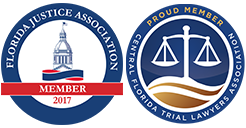 One question I am often asked when I am meeting with a new client who has been injured in an Orlando or Florida car accident is “Why should my insurance company pay for my medical bills when the accident was not my fault”? The simple answer is that it’s the law in Florida. A law that goes back to the early 1970s. Back then, Florida’s legislature decided to enact what is known as the Florida No-Fault law. Basically, under Florida’s No-Fault law, a person who is injured in a car accident must use their own insurance company to pay their medical bills whether or not they are at fault for causing the car accident. The law requires the injured person’s insurance to pay a percentage of their medical bills (80%) and lost wages (60%). While that might sound crazy, there is actually a very good reason this law was passed. To protect you from overwhelming medical bills that you might incur as a result of injuries received in a car accident.
One question I am often asked when I am meeting with a new client who has been injured in an Orlando or Florida car accident is “Why should my insurance company pay for my medical bills when the accident was not my fault”? The simple answer is that it’s the law in Florida. A law that goes back to the early 1970s. Back then, Florida’s legislature decided to enact what is known as the Florida No-Fault law. Basically, under Florida’s No-Fault law, a person who is injured in a car accident must use their own insurance company to pay their medical bills whether or not they are at fault for causing the car accident. The law requires the injured person’s insurance to pay a percentage of their medical bills (80%) and lost wages (60%). While that might sound crazy, there is actually a very good reason this law was passed. To protect you from overwhelming medical bills that you might incur as a result of injuries received in a car accident.Not all states have a No-Fault law. In states that do not have a No-Fault law, medical bills and lost wages are only paid by the insurance company for the person who causes the accident. While that might sound reasonable, there are problems in states that do not have a No-Fault law. First, what if the drivers involved in the accident dispute who actually caused the accident? This is commonly seen in what we call a red light, green light case. In these types of accidents, each driver says they had the green light and that the other driver is at fault. Usually there are no witnesses to prove conclusively who was at fault and often times the police in these accidents cannot determine who caused the accident. So in these states, if no one admits fault or there is no evidence to prove who was at fault, then no medical bills and lost wages will get paid until the accident case is settled. Second, even if there is no dispute as to which driver caused the car accident, the medical bills and lost wages would likely not be paid until the case settles. Getting a case to the point of settlement could take months, if not years. Third, if a person injured in a car accident did not have health insurance, the medical treatment options available to him or her could be very limited. You would have to find a doctor or other medical provider to treat them without getting paid right away. Many doctors and other health professionals, understandably, do not want to treat persons injured in accidents without out the prospects of getting paid for the services they provide.
In order to avoid the disputes and to afford drivers in Florida access to treatment for their injuries sustained in a car accident, Florida passed the No-Fault law. The purpose of this law is to make sure payment for medical care is provided to all persons involved in a car accident in Florida. The law provides payment to the injured person through their own insurance whether or not they were at fault for causing the car accident. The law is to “provide for medical, surgical, funeral, and disability insurance benefits without regard to fault ” and to provide “swift and virtually automatic payment [of medical bills and lost wages] so that the injured [person} may get on with his life without undue financial interruption”. The No-Fault law is not the end all when it comes to paying for medical bills and lost wages. But it is designed to provide “a minimum level of insurance benefits without regard to fault”. And because the law applies to any person involved in a car accident, everyone is covered to some degree under Florida law for accident related medical bills and lost wages.
Now, as seen above, the No-Fault law is to provide a minimum level or coverage. It does not require your insurance company to pay 100% of medical bills and lost wages. The law requires that each person who owns a car in Florida have the basic No-Fault insurance coverage. That basic No-Fault coverage amount is $10,000. This amount covers both medical bills and lost wages. IT will pay 80% of your medical bills and 60% of your lost wages. This minimum coverage will also cover a number of other car accident related expenses such as mileage driven to and from medical care and household services. For a detailed review of what exactly the No-Fault law does cover, please see our newsletter titled Florida’s Automobile Insurance Law. You can find that newsletter by clicking HERE.
So as you can see, Florida’s No-Fault law seeks to provide a minimum degree of protection to people who are inured in car accidents in Florida. This minimum coverage should allow them to obtain medical treatment from qualified medical provides. It will also provide some protection for lost wages. There are problems with Florida’s No-Fault law, but I will save that discussion for another blog entry. For now, suffice it to know that as long as you have this required automobile accident coverage, you will have insurance to cover your basic medical bill and lost wage expenses.
Please make sure you have adequate automobile insurance protection. Having the minimum coverage the No-Fault law requires is a start, but in many instances is not enough. Again, please see our newsletter on Florida’s Automobile Insurance Law.
If you have been injured in an accident that was caused by someone else, please contact our Orlando personal injury and car accident attorneys for answers to your questions. You may call us at 407-423-1313 or 888- 282-6529 or fill out our CONTACT FORM. All consultations are free and without obligation. And remember, there are no fees or costs unless we make a recovery for you.
